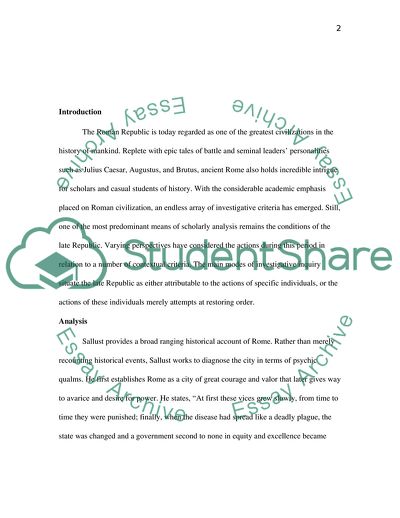Cite this document
(To what extent can we attribute the conditions of the late Republic to Essay Example | Topics and Well Written Essays - 1500 words, n.d.)
To what extent can we attribute the conditions of the late Republic to Essay Example | Topics and Well Written Essays - 1500 words. https://studentshare.org/history/1778911-to-what-extent-can-we-attribute-the-conditions-of-the-late-republic-to-the-actions-of-single-individuals-or-were-the-actions-of-these-individuals-actually-attempts-at-restoring-order
To what extent can we attribute the conditions of the late Republic to Essay Example | Topics and Well Written Essays - 1500 words. https://studentshare.org/history/1778911-to-what-extent-can-we-attribute-the-conditions-of-the-late-republic-to-the-actions-of-single-individuals-or-were-the-actions-of-these-individuals-actually-attempts-at-restoring-order
(To What Extent Can We Attribute the Conditions of the Late Republic to Essay Example | Topics and Well Written Essays - 1500 Words)
To What Extent Can We Attribute the Conditions of the Late Republic to Essay Example | Topics and Well Written Essays - 1500 Words. https://studentshare.org/history/1778911-to-what-extent-can-we-attribute-the-conditions-of-the-late-republic-to-the-actions-of-single-individuals-or-were-the-actions-of-these-individuals-actually-attempts-at-restoring-order.
To What Extent Can We Attribute the Conditions of the Late Republic to Essay Example | Topics and Well Written Essays - 1500 Words. https://studentshare.org/history/1778911-to-what-extent-can-we-attribute-the-conditions-of-the-late-republic-to-the-actions-of-single-individuals-or-were-the-actions-of-these-individuals-actually-attempts-at-restoring-order.
“To What Extent Can We Attribute the Conditions of the Late Republic to Essay Example | Topics and Well Written Essays - 1500 Words”. https://studentshare.org/history/1778911-to-what-extent-can-we-attribute-the-conditions-of-the-late-republic-to-the-actions-of-single-individuals-or-were-the-actions-of-these-individuals-actually-attempts-at-restoring-order.


